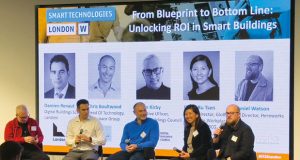Q: How did you progress through the profession to your current role?
I fell into FM – my very first role was as a temp on an FM helpdesk in Plymouth (Interserve MoD account). I quickly realised that getting plumbers, electricians and window fitters out to help people who needed their property repairing was really rewarding and I never really left the industry after that! I then worked in Voids and Relets as a temp for Plymouth City Council, then Housing associations in Devon before moving to Yorkshire 11 years ago. I’ve been an FM looking after data centres, offices, a bank, a national charity and now a leading engineering and manufacturing organisation.
Q: Do you have any qualifications or training in FM and related areas such as health and safety? And how have you benefited from them?
I was never a straight A student at school, but I’ve thrown myself into any professional training I can. I have IOSH Managing Safely, NEBOSH General Cert, IEMA Environmental Management and I also have ISO 22301 (Business Continuity) Implementer and Lead Internal Auditor. Every single course I’ve been on has given me the skills to be better at my job and improve the safety of those people I look after.
Q: What is your greatest contribution to the FM sector, or your current role?
I’d like to think that I’ve opened the doors to make mental health and diversity in FM a more accessible topic – I’ve tried very hard to be open and honest with my employers and colleagues, and clients and to have open discussions with my team – we look out for each other and are always there at the end of the phone, for anyone, no matter what their role is.
I also think that pushing CSR at all levels is very important – we have a responsibility in business to support the community we operate in and have a duty to give something back – I love to bake so Macmillan Coffee mornings are always a hot topic, but also supporting CALM’s work to provide men with an outlet to discuss their mental health and suicide prevention works is a topic that is very important to me.
Q: What do you enjoy most about working in FM?
It sounds like a cliché but knowing that what I do makes a difference to people and helps make their lives easier is definitely something that motivates me. We make sure the essentials happen, the bins get emptied, the toilets are cleaned and there is always chocolate in the vending machines! People ask me what I do and the very simple answer that really resonates with them and helps people get what we do, is “I order toilet rolls!” It’s the things that happen without people needing to say anything.
Q: Do you have future projects or career goals in mind?
I recently started an MSc in Facilities Management with Leeds Beckett University – it’s a two-year part time, distance learning course that will give me the skills and exposure to thinking in new ways and understanding the sides of FM that I’m not very experienced in. It’s hard work but I’m hopeful that it will enable me to progress into senior roles in the future – maybe I’ll be a Director one day!
Q: What personal qualities do you think are most needed for a successful career in FM?
Patience, a customer service focused mind, and willingness to get stuck in, no matter what the issue. There have been times where I’ve needed to don wellies and bail out a flooded part of a building, help do a final deep clean of a new toilet block ready for opening and do some emergency cleaning in a flooded toilet – all these things helped get the job done, helped the customer out and made people’s lives easier.
Q: What do you think would make the biggest difference to catering the FM sector?
That it is a career that can be really rewarding and not just something to fall into and plod along in. I don’t think it’s a career that gets talked about when people are leaving school/uni but the industry is growing and changing so quickly – with an increase in “Smart” buildings, building/environmental security and environmental goals, having people actively choose to join the industry and sector will create a cohort of engaged and enthusiastic FM professionals to see us into the future.
Q: Are you a member of any FM association or body and if so what benefits do you think they provide?
I’m not at the moment – mainly because I keep putting it off, but since I started my MSc, I’ve used so many resources from journals and professional bodies that I really need to bite the bullet and get my subscription sorted!
Q: What advice would you give to someone coming into the profession now?
Be open to possibilities – work your way up and get exposure to as many facets of the industry as you can. Definitely put some time in on a helpdesk (it will be invaluable in the future) and if you can find a mentor in the industry ask them to help you – I’ve learnt so much from people I’ve worked with. Also, if you are offered secondments to other departments, take them! The cross skills you will pick up can only help your career in the long run – and always take biscuits when you see your engineers!
Q: What are the greatest challenges of working in FM?
Making sure we deliver our clients expectations, every time, on time and within budget. But also, making sure we hit our environmental goals – we all want to protect our environment and coming up with solutions to problems that both deliver the client requirements but also reduce consumption, waste and carbon is something that will never go away and will only become more important as time goes on.
Q: What do you predict could be the main changes to the FM sector over the next few years?
The drive to reduce carbon and waste – as an industry we have enormous responsibility to advise our clients how they can help in the drive to reduce carbon and waste; we should be leading from the very start of the process. Procurement has a major role to play by sourcing suppliers who have agreed to reduce waste, reduce landfill and we can influence our clients in a positive way by choosing to reduce consumption of goods, energy and by encouraging energy brokers to negotiate green energy contracts where ever possible.




